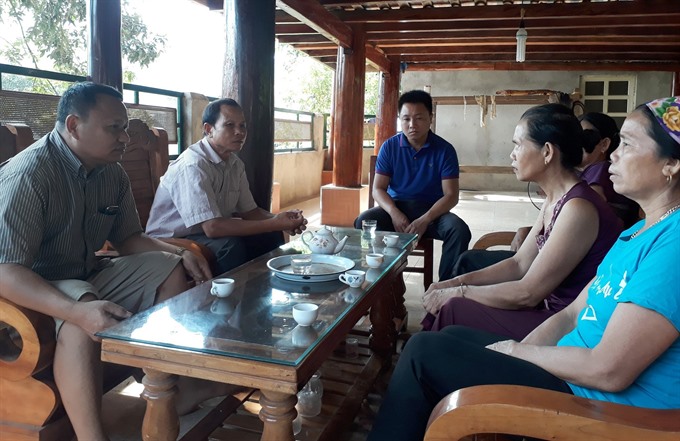 Society
Society

Many senior people want to relax and spend more time with their family as they get older but some elderly in Thanh Hóa Province’s mountainous district of Quan Sơn are proving that they play bigger role in the society.
 |
| 71-year-old Lộc Văn Yên (second from left), residing in Tam Lư Commune’s Hát Village, is the one who give strength to study encouragement movement here. He called on families within his family tree to set up the first study encouragement sub-association in Tam Lư Commune with the participation of 50 households— VNA/VNS Photo Nguyễn Nam |
THANH HÓA — Many elderly people want to relax and spend more time with their families, but some old people in Thanh Hóa Province’s mountainous district of Quan Sơn are proving they can still play a big role in society.
Seventy-two-year-old village chief Hơ Văn Di from Ché Lầu Village in Quan Sơn District’s Na Mèo Commune is one example.
Despite his age, he has worked tirelessly to change the old habits of locals and improve social order in border areas.
As a border soldier, he often travels along the 30km border area of Na Mèo Commune adjacent to Laos on patrol.
Every day, together with soldiers from Na Mèo Border Gates, he goes to every house in the village to raise awareness about the harms of drugs and urges them not to get involved in drug trafficking.
“Ten years ago, enticed by some bad elements in society, a lot of people in my village planted opium trees in fields,” Di recalled.
The day he detected the incident, Di asked local authorities to go with him to visit each house in the village to explain the harms of opium plants and convince them to destroy the plants.
He also introduced traditional medical plants and other kinds of cash crops to residents as replacements.
Due to his efforts, Di was granted a certificate of merit from Prime Minister Nguyễn Xuân Phúc at a meeting to honour reputable individuals of ethnic minorities in 2017.
Another hardworking elderly person is Lộc Văn Yên, 71, residing in Tam Lư Commune’s Hát Village, who is known for encouraging studying in the locality.
Aside from raising his own educated children, he has called on his relatives to set up study encouragement groups in Tam Lư Commune, with 50 households involved.
Due to improved awareness of the importance of education, no children in his family tree have dropped out of school. The number of students admitted to universities and colleges has increased year after year and most graduates have jobs. Inspired by this initiative, other villages in the region have followed suit.
Yên also mobilised local residents to give donations to build Tam Lư Secondary School.
In Trung Hạ Commune, hardly anyone doesn’t know the name of Hà Thu Thai, 74, a Thai ethnic person.
Thai was among few people in the Chiềng Sầy village who runs social works, helping hasten the progress of rural development in the locality.
Recalling the first days, he said: “It was difficult for communal staff to persuade people to use fertiliser tablets because local residents used to enrich rice and other crops with chemical fertiliser in terrace fields. Then I tried to convince my relatives to apply it first."
He explained the benefit of fertiliser tablets to them, saying the tablets were deep under the ground so they wouldn’t be washed away by rain.
Persuaded by his action, many local residents volunteered to contribute land to build inter-village roads. As a result, Chiềng Sầy village now has a 700-metre-long concrete road. Traders can drive their cars to the village to buy bamboo products.
Following his call, besides donating 69,000sq.m of land, local people also contributed VNĐ355 million (US$14,350) and 800 working days to upgrade 1.2km of rural roads.
Nguyễn Ngọc Tiến, secretary of Quan Sơn District’s Party Committee, said village chiefs like Di, Thai and Yên played an important role in the community. They had gained the respect of villagers and were trusted.
With thorough understanding of ethnic minorities’ customs, village chiefs have informed people of the Government’s policies and called on them to follow their examples, he said.
They also pioneer in implementing poverty reduction programmes and encourage villagers to apply advanced techniques in cultivation and husbandry which help increase profits. — VNS




